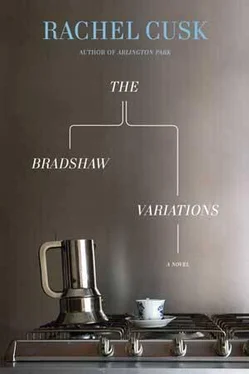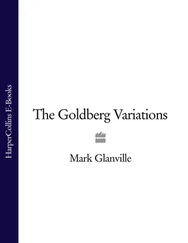She thinks now about Clare’s final act of renunciation: again, she barely noticed it at the time, but it reminds Tonie that she herself could have renounced Thomas, that she could have lived the other life, the non-Thomas life, as Clare even now is presumably doing. She wonders which life has turned out to be better. She wonders why she wanted one so much more than the other, when in fact, in a way, they are the same. She realises that of the three of them, she, Tonie, is the only one who did not act decisively.
‘It’s so weird that you don’t think about her,’ she says.
He is still holding the saucepan. He is wondering what she means. She sees that for him, too, not thinking about Clare has become the same as thinking about her. All the same he is offering it to her, to Tonie, as a tribute, a gift; the latest incarnation of his sense of honour. But she wants to remind him of all that caution and concern he went in for by the river. She wants to draw his attention to the fact that once, when it mattered, he stinted Tonie’s share. He ought to know that Tonie has felt hungry ever since, that she worries about this hunger, worries that she will be driven one day to placate it.
‘I wouldn’t like that, if it were me,’ she says.
It’s true, she wouldn’t.
‘But it isn’t you,’ he says.
‘It could just as well be.’
He looks at her, puzzled. He sighs, shakes his head, puts the saucepan in the cupboard.
‘Would it be better if I said I thought about her all the time?’ he says.
The house is such an odd little house, tall and thin and spindly as a doll’s house. The Swanns joke to their friends that when they visit Antonia’s house they have to breathe in.
Recently, their elder daughter Elizabeth moved with her family to an eighteenth-century manor house with five acres, a swimming pool and superb transport links to London for James: there can be no jokes about that. Mrs Swann has encountered unexpected difficulties in describing Elizabeth’s house to her friends. She doesn’t know what tone to strike. She has always ridden Elizabeth well, like an expert jockey rides a racehorse, but lately she has felt herself to be clinging on as the pace gets faster and faster. She finds that she has little to say on the subject: she is simply trying to maintain a foothold.
So there has, unusually, been some relief to be had in the contemplation of Antonia, whose affairs Mrs Swann can encompass in conversation without effort, in the way that a novelist encompasses a minor character. It is achieved by means of repetition: when Antonia appears, it is to enact the qualities of contradiction and eccentricity that already define her to her audience. She is never developed, merely confirmed. Currently, it is far easier for Mrs Swann to revert to stock than to consider how the story of Elizabeth’s unstoppable rise, with all its dark tumult of jealousy and fear, could be told without publicly diminishing its narrator.
But as her husband turns the car up Montague Street, Mrs Swann remembers that it isn’t like that at all. Her sense of Antonia as a set of quirks, like a set of piano keys awaiting her touch, vanishes entirely. Instead there is a dense atmosphere of bitterness and failure that has not enveloped her since the last time she was here, and that tells her better than any road map that her youngest daughter’s house is nearby.
Her husband feels it too. He eyes the street. They linger, not wanting to leave the safe harbour of their fourlitre Mercedes.
‘Will the car be safe out here, do you think?’ he says.
It is Thomas who opens the door. Antonia is standing just behind, in the narrow hall. Mrs Swann sees her eyes, wide and unblinking, sees their expression of wonderment. From the street the hall looks dark, filled with shadows, and Antonia’s eyes are floating among them, gazing at Mrs Swann as though they can see into her soul.
‘Mind your head,’ she says to her husband, as he passes ahead of her beneath the door frame.
He waits for her on the threshold.
‘Be careful you don’t trip,’ he says. ‘There’s a loose board in the floor there.’
Once inside Mrs Swann immediately produces the bag of Christmas presents that is the occasion for their visit. They are lavishly wrapped, the paper glossy and unmarked, the gold ribbon twirled into perfect ringlets. Her husband wrapped them. He is generous with the paper, as only a man can be, for he barely knows what it is he is wrapping. Mrs Swann bought the presents, alone. She left it to her husband to be generous with the paper: her own involvement is with what is inside.
Thomas tries to take the presents, and Mrs Swann discovers that she is reluctant to part with them. Her hands will not let go of the bag.
‘Where’s little one?’ she says, looking around her for Alexa.
‘She’s at a birthday party,’ Thomas says.
‘Oh no!’ cries Mrs Swann. She is astonished. Not once has she imagined this scene occurring without the presence of a child. It is like Mass occurring without a priest at the altar. It casts a dreadful, civilian greyness over everything. ‘Couldn’t she have missed it, just this once?’
Her husband puts a cautionary hand on her arm.
‘Selina,’ he says, ‘don’t get involved. The child has her own life to lead.’
She understands him: he is speaking to her in a language that underlies even her own consciousness, that is the more private and profound for the fact that over the years it has blotted out her native tongue, solitude.
‘Well,’ Thomas says, ‘only until four o’clock.’ He looks at his watch. ‘She should be back any minute.’
‘Oh,’ says Mrs Swann. She doesn’t care when Alexa is coming back. What she wanted was to have her here when she arrived. ‘Hello, Antonia,’ she adds, so that it sounds like an afterthought.
Antonia steps forward, receives a cool kiss on the cheek.
‘Hey, Mum,’ she says.
Her daughter is wearing black trousers, a black T-shirt, black shoes — all negative, like those things in space that can swallow you whole while taking up no room at all. She wears no make-up or jewellery. Her full, fleshcoloured mouth is provocative in its nakedness. Even as a teenager Antonia wore black. The daughters of Mrs Swann’s friends wore Laura Ashley prints with frilled collars, smart little pumps, mohair jerseys in pastel shades, while Antonia went around like a Greek widow in black. Someone once called her that to Mrs Swann’s face — your daughter, the Greek Widow — and there in the supermarket Mrs Swann felt the hot uprush of rage all fenced around with powerlessness, so that she went home bursting with it, with a boiling anger whose urgent need for discharge seemed to threaten a public indignity of the kind Mrs Swann had not experienced since childhood. She remembers it now, the feeling that she might be about to disgrace herself, a feeling so violent, so overpowering, that it led Mrs Swann to pity herself, to pity herself profoundly. And even afterwards, when she had found Antonia in her room and unleashed herself on her daughter’s black-clad form, when she had said and done things that seemed to mirror the disgrace and even, in moments, to become it, she could not feel other than a victim, hitting out in whatever way she could at her attacker.
Such scenes have characterised her relations with Antonia from the beginning: even on her first day of life, Mrs Swann remembers feeling very distinctly that she had lost something, and that it was Antonia who had stolen it from her. She remembers a phrase — codes of formality — that haunted her during Antonia’s babyhood, for the fact that she had already irrevocably violated them. The problem is that once broken, such boundaries are difficult to rebuild. She has tried, but they crumble at the slightest pressure. It would have been different if her husband had taken Antonia’s side. But he did not: Mrs Swann wouldn’t allow him to. Over the years she has often considered cutting free of this control and isolating herself in her anger; she has sensed, instinctively, that if her anger could be isolated it could be cured. But there is something deeper than her anger, something pre-existing, something original and authentic that is only revealed when her husband allies himself with Antonia. Mrs Swann fears it more than anything else. She takes one look at it and knows that there is no alternative — has never been nor ever will be any alternative — to her and her husband standing united against their daughter.
Читать дальше












